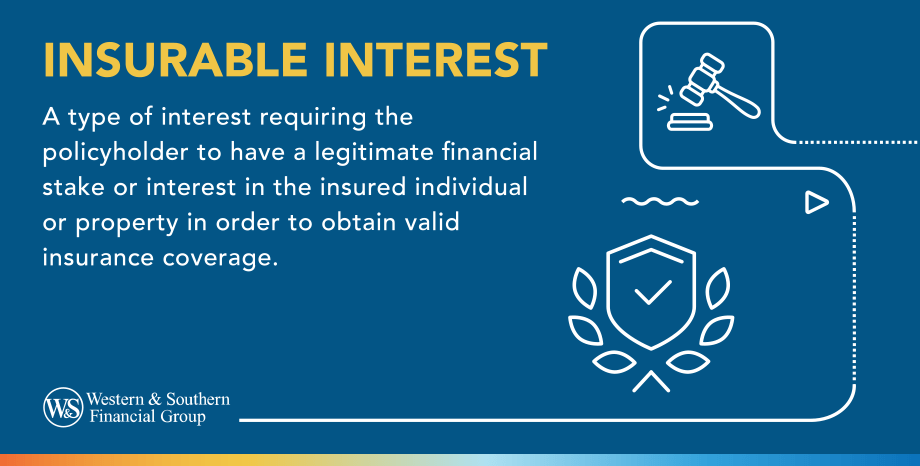Table of Contents
Table of Contents


Key Takeaways
- Insurable interest ensures that policies are taken out for legitimate financial protection rather than speculative or unethical purposes.
- Proving insurable interest in the context of a life insurance policy involves demonstrating a legitimate financial interest or connection to the insured individual.
- It's important to work closely with an insurance company during the application process to understand their specific requirements for proving insurable interest.
Before obtaining life insurance, individuals and businesses must prove they have an interest that is in fact insurable. This is the linchpin that ensures insurance policies serve their intended purpose: to provide genuine financial protection against unforeseen risks.
Whether it's life insurance, property insurance or any other form of insurance, insurable interest underpins the legitimacy and ethical use of an insurance policy. Here you can learn the definition of insurable interest as well consider its significance in various insurance contexts. Better understand why it remains a fundamental requirement in the world of risk management and financial protection.
Insurable Interest Defined
As an essential concept in insurance, "insurable interest" varies depending on the type of coverage. It ensures that policies are taken out for legitimate financial protection, rather than speculative or unethical purposes. Without it, insurance contracts could be used for purposes that would amount to gambling on someone's life or property, purposes fundamentally opposed to the principles of insurance.
Types of Insurable Interest
Based on this insurable interest definition, some different types include:
- Life: This type is typically established when the policyholder can demonstrate a financial interest in the well-being of the insured individual. It often includes spouses, parents, children, business partners and those who are financially dependent on the insured person.
- Property: This type is based on insurable interest in physical assets, such as homes, vehicles or belongings. Property owners or those with a financial stake in the property, such as mortgage lenders, have insurable interest.
- Liability: This type involves legal responsibilities and applies to policyholders who may be legally liable for damages or injuries to others. It can include businesses, homeowners or individuals with potential liability, such as in auto insurance.
The Indemnification Principle
The indemnification principle is a fundamental concept in insurance that outlines the purpose of insurance contracts, specifically regarding underwriting and moral hazard. It states that insurance is intended to indemnify (compensate) the insured party for their financial losses — not to provide an opportunity for profit or gain.
Insurers follow the indemnification principle during the underwriting process. They evaluate the insurable interest, the potential for loss and the financial stake of the policyholder to determine the appropriate coverage and premium. The goal of underwriting is to ensure the policyholder is not overinsured, which could lead to moral hazard where the insured party might intentionally cause a loss to profit from the insurance payout.
Who Has an Insurable Interest?
An insurable interest is a fundamental requirement for purchasing insurance. It helps to ensure that the person or entity seeking protection has a legitimate financial stake in the insured property or individual. Insurable interest is essential to prevent insurance contracts from being used for speculative or unethical purposes.
Examples of Who Has Insurable Interest
Here are some examples of who has insurable interest as it pertains to insurance type:
Life Insurance
- Spouses often have interest that is insurable in each other's lives because the financial well-being of one spouse may be directly tied to the other's income and contributions.
- Parents may have an insurable interest in the lives of their dependent children to ensure financial protection in case of a child's death.
- Business partners may have an insurable interest in each other's lives to protect their joint enterprise.
Property Insurance
- Property owners need to protect their homes, vehicles or belongings as the value and financial well-being directly relate to these assets.
- Mortgage lenders have an interest that is insurable in a property to protect their financial stake in the event of damage or loss.
Liability Insurance
- Businesses, homeowners or individuals who may be legally liable for damages or injuries to others have a legal and financial interest in obtaining liability insurance.
Health Insurance
- Individuals or their employers have an interest in health insurance to cover medical expenses and ensure access to health care services.
- Guardians or caretakers may have a legitimate interest in the health of minors or dependents for whom they are responsible.
Auto Insurance
- Vehicle owners have a financial and legal interest in insuring their cars to protect against potential financial losses resulting from accidents, theft or damage.
- Lien holders or auto lenders have legitimate interest in the insured vehicle to safeguard their financial interests in case of loss.
Business Insurance
- Business owners have a certain interest in their enterprises, including insuring property, employees and potential business interruptions.
- Partners or stakeholders may have interest that is insurable in each other's lives or roles within the business.
The specific circumstances and relationships that constitute insurable interest can vary by jurisdiction and the type of insurance being considered. To ensure the legitimacy of the coverage, potential policyholders must provide accurate information and meet the associated requirements when applying for insured protection.
Insurable interest is crucial for valid life insurance coverage. Get a Life Insurance Quote
What Is Insurable Interest in Life Insurance?
Insurable interest in life insurance refers to a fundamental principle that necessitates the policyholder have a legitimate financial stake or interest in the life of the person being insured. In other words, the policyholder must demonstrate that they would suffer a financial loss or hardship if the insured individual were to die. This requirement is in place to ensure that life insurance is not used for speculative or unethical purposes and that the insurance policy does serve its intended function of providing financial protection.
When Does Insurable Interest Exist in a Life Insurance Policy?
To obtain insurance coverage, an interest must exist at two specific points in a life insurance policy: at the policy inception and at the time of the claim.
- Policy inception (application): At the time of applying for a life insurance policy, the policyholder (the person taking out the policy) must demonstrate insurable interest in the life of the insured individual. This is a fundamental requirement for the policy to be issued. The policyholder must establish a legitimate financial interest in the insured person's well-being, demonstrating that they would suffer a financial loss or hardship if the insured individual were to die. The policyholder typically provides information about their relationship or financial connection to the insured person during the application process.
- Time of claim: Insurable interest must also exist at the time when a claim is made on the life insurance policy, such as when the insured person passes away. If insurable interest has ceased to exist by the time of the claim, the insurance company may have grounds to deny the claim. In other words, if the financial connection or interest that originally justified the policy no longer exists, the insurance contract may no longer be valid.
How to Prove Insurable Interest
Proving insurable interest in the context of a life insurance policy involves demonstrating a legitimate financial interest or connection to the insured individual. The specific methods and requirements for proving insurable interest may vary by jurisdiction and insurance company. Some common ways to do so include:
- Family relationship: If the insurable interest is based on a family relationship, such as a spouse or child, providing evidence of the family relationship, such as marriage certificates or birth certificates, may be required.
- Financial dependency: If the insurable interest is rooted in financial dependency, documentation of the financial connection may be necessary. This could include financial statements, tax records or other proof of dependency.
- Business partnership: In the case of business partners, documentation of the business organization, the role of the insured person within the business and the financial implications of their death on the business may be required.
- Creditor-debtor relationship: Creditors seeking insurance on a debtor may need to provide evidence of the debt and the financial interest they have in the insured individual's life, such as loan agreements or financial contracts.
- Legal requirements: In cases where insurable interest is required by law, such as court-ordered life insurance for alimony or child support, the legal documents and court orders may serve as proof of the insurable interest.
- Application and documentation: When applying for the life insurance policy, the policyholder will typically need to provide information about the nature of the insurable interest. The insurance company may review this information and request additional documentation as needed.
It's important to work closely with the insurance company during the application process to understand their specific requirements for proving insurable interest. Providing accurate and thorough documentation is essential to ensure the policy is issued and that any future claims are valid.
Failure to prove insurable interest can result in the denial of a life insurance claim or the voiding of the insurance contract. As such, it's crucial to comply with the insurer's requirements and the legal standards applicable in your jurisdiction.
A Financial Professional Can Help
It's important for individuals and businesses to grasp the significance of insurable interest and its role in safeguarding their financial interests. Through clear communication, a financial professional can help you understand how insurable interest helps act as a protective shield against financial losses and liabilities in times of unforeseen adversity.
By thoroughly understanding your unique needs and risk exposures, a financial professional can help tailor insurance solutions that align with your specific circumstances.
Help protect those who depend on you by securing the right life insurance. Get a Life Insurance Quote
Frequently Asked Questions
Can you get life insurance on anyone?
In general, you cannot get life insurance on anyone without their knowledge and consent or without an insurable interest. That means the policyholder must have a legitimate financial interest in the insured person's well-being. For example, when insurable interest is established through certain legal relationships, such as spouses, immediate family members or business partners, it's possible to obtain life insurance on the individual with their knowledge and consent.
Attempting to obtain life insurance on someone without their knowledge and consent — or for speculative or unethical purposes — is generally considered fraud and is illegal. Following legal and ethical guidelines when purchasing life insurance is essential to protect the policy's legitimacy and prevent potential legal consequences. Always consult with an insurance professional or legal expert for guidance on specific situations and requirements.
What is moral hazard?
Moral hazard refers to the increased risk of loss when individuals or entities are less cautious because they have insurance coverage. The indemnification principle is a countermeasure against moral hazard. Insurance contracts are designed to indemnify the insured party to the extent of their actual loss, but not to make them better off financially than they were before the loss.
Overcompensation could lead to moral hazard if the insured has an incentive to take excessive risks, as they may not bear the full financial consequences of their actions. To address this, insurance policies often include deductibles, co-pays and policy limits to share the financial burden between the insurer and the insured, discouraging reckless behavior.
Is insurable interest required on life insurance policies?
Yes, insurable interest is typically required on life insurance policies. Insurable interest is a fundamental principle in insurance, including life insurance,. It helps ensure that the person taking out the policy (the policyholder) has a legitimate financial interest in safeguarding the life of the insured individual. This requirement is in place to prevent insurance policies from being used for speculative or unethical purposes and to ensure that life insurance serves its intended purpose, which is to provide financial protection.






































